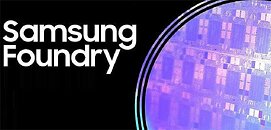- Joined
- Aug 19, 2017
- Messages
- 2,941 (1.05/day)
Samsung Foundry could abandon its 1.4 nm (SF1.4) process node initially targeted for 2027 production, according to industry leaker @Jukanlosreve. This decision comes amid ongoing yield problems with the company's 3 nm SF3 node and follows the shutdown of underutilized 5 nm and 7 nm production lines. This could significantly impact Samsung's technology roadmap, which had positioned SF1.4 alongside automotive-focused SF2A and SF2Z nodes. According to Korea Economic Daily data, the foundry division's market share has fallen to 8.2% compared to TSMC's 67.1%. Samsung continues the development of Exynos 2600 on the SF2 node and maintains orders from Japan's Preferred Networks but has failed to attract major clients beyond Chinese firms, avoiding US sanctions. Internal restructuring appears imminent, with reports suggesting the Exynos design team may move under the Mobile Experience division.
While Samsung may prioritize improving yields on existing nodes rather than pursuing SF1.4, this approach risks competitive disadvantages in high-performance computing and AI markets. The SF2Z node with Backside Power Delivery Network (BPDN) technology remains under development, though its commercial viability depends on resolving broader manufacturing issues. Samsung's retreat would further fall behind advanced node manufacturing, competing with TSMC and potentially Intel, raising questions about competition in leading-edge semiconductor fabrication. The company's decisions in the coming months will determine whether it can regain manufacturing credibility or face production of trailing-edge semiconductor nodes. Manufacturing advanced silicon remains a challenge for everyone except TSMC.

View at TechPowerUp Main Site | Source
While Samsung may prioritize improving yields on existing nodes rather than pursuing SF1.4, this approach risks competitive disadvantages in high-performance computing and AI markets. The SF2Z node with Backside Power Delivery Network (BPDN) technology remains under development, though its commercial viability depends on resolving broader manufacturing issues. Samsung's retreat would further fall behind advanced node manufacturing, competing with TSMC and potentially Intel, raising questions about competition in leading-edge semiconductor fabrication. The company's decisions in the coming months will determine whether it can regain manufacturing credibility or face production of trailing-edge semiconductor nodes. Manufacturing advanced silicon remains a challenge for everyone except TSMC.

View at TechPowerUp Main Site | Source







